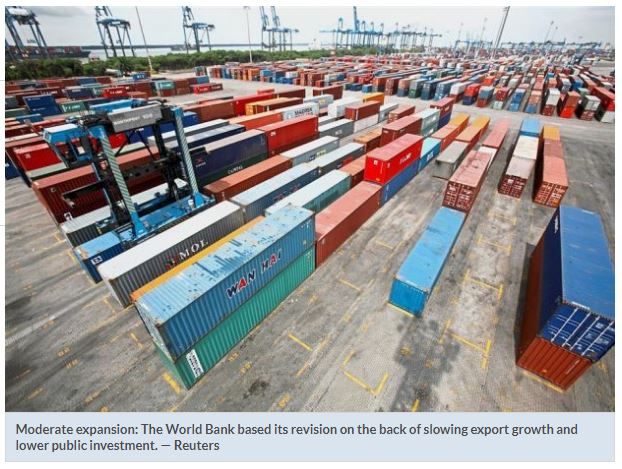World Bank sees Malaysia’s growth moderating until 2020
PETALING JAYA: The World Bank has cut Malaysia’s gross domestic product (GDP) growth forecast for 2018 to 4.9% from 5.4% on the back of slowing export growth and lower public investment.
It expects the country’s pace of economic expansion to continue moderating until 2020.
Although the move is largely unsurprising, the bank’s downward revision in its latest “East Asia and Pacific Economic Update” report marked a significant reduction from its earlier estimate of 5.4% in April.
Within the Asean region excluding Singapore, Malaysia and Myanmar saw the biggest cut in growth estimate this year by 0.5 percentage points each.
While the modest expansion of gross fixed capital formation and lower-than-expected public capital expenditure (capex) could dampen the country’s growth prospects, the continued strong growth in private consumption is expected to support domestic demand.
The World Bank projected the country’s economic growth to moderate to 4.7% in 2019 and 4.6% in 2020.
For context, last year, the domestic economy grew 5.9%.
The bank also cautioned that the government may not be able to achieve its fiscal deficit target this year, although Finance Minister Lim Guan Eng has reaffirmed earlier the Cabinet’s commitment to do so.
“Achieving the fiscal deficit target of 2.8% of GDP is subject to the economy growing above 5%.
“Otherwise, the government may elect to run a slightly larger fiscal deficit,” the World Bank pointed out in the report.
The previous Barisan Nasional government’s fiscal consolidation measures have brought down Malaysia’s fiscal deficit significantly over the years to 3% in 2017, down from 6.7% in 2009.
“Higher subsidy expenditures and the revenue shortfall from the removal of the goods and services tax (GST) are expected to be counter-balanced by higher oil-related revenues, as well as reduced outlays for non-priority current expenditure and deferment of capex,” said the bank.
Amid the slowdown in economic growth, the World Bank expected Malaysia to achieve the coveted high-income country status “at some point between 2020 and 2024”.
“As a highly-open economy, Malaysia will continue to face substantial risks relating to uncertainty in the external environment.
“Heightened financial market volatility either triggered by shifting monetary policy expectations in advanced economies or crisis in other regions could spread across emerging economies, including Malaysia, through capital outflows and pressures on exchange rates.
“Another key risk relates to the escalation in protectionist tendencies and trade tensions in some major economies which could have an adverse impact on Malaysia, given its high level of integration with global markets and its dependence on global value chains as a source of growth.
“On the domestic front, the implementation of several election pledges will require careful management of potential risks. The change from the GST back to the sales and service tax and the adjustment to the fuel pricing mechanism – in the absence of adequate compensatory measures – would constrain the fiscal policy space, and place greater reliance on less stable direct taxation and oil-related revenue,” it said.
Source: https://www.thestar.com.my/business/business-news/2018/10/05/world-bank-revises-downward-msia-gdp/#6plcOxhI5b39Q2lY.99


 Thailand
Thailand




